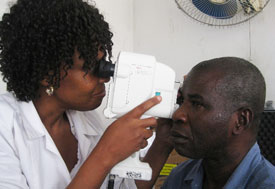Profile: Fogarty Fellow Dr Oluwatoyin F Fafowora researches inherited childhood glaucoma in Nigeria
November / December 2012 | Volume 11, Issue 6

Photo courtesy of Dr. Oluwatoyin F. Fafowora
Former Fogarty Fellow Dr. Oluwatoyin F. Fafowora
is studying the genetic basis for juvenile-onset
glaucoma, which is prevalent in West Africa.
In the ophthalmology practice, one patient stood out: a young man diagnosed with glaucoma who doggedly pursued a career as an accountant until he could no longer see. He had a hereditary form of glaucoma that typically develops much earlier in life than the well-known adult-onset type, and that currently is resistant to medical and surgical treatment.
"You are seeing a 15-, 17-, 20-year-old who has his life mapped out before him and you discover he is going blind from juvenile-onset glaucoma," said Dr. Oluwatoyin F. Fafowora, a former ophthalmology clinical practitioner, who was moved by her patient. "Because it affects the younger generation, I found it rather painful to be treating it. I very much prefer research. It's more meaningful."
The door to research opened when she received a Fogarty fellowship in 2008 to engage in global health studies. Fogarty's
Global Health Program for Fellows and Scholars offers postdoctoral and doctoral students the opportunity to spend a year collaborating with a mentor at an established research site in a developing country. The experience is intended to encourage early-career scientists to pursue global health research, provide a training resource to the host institutions and nurture international research partnerships.
Under her fellowship, managed by the University of California, Los Angeles (UCLA), Fafowora returned to her native Nigeria to investigate potential genes behind the specific condition that had struck her young patient - juvenile-onset open-angle glaucoma. This form of glaucoma is prevalent throughout West Africa, allowing her to tap into a larger pool of patients than would be possible in the U.S. Fafowora led a team at University College Hospital in Ibadan that tracked down families with a history of the disease and collected samples of their DNA.
Earlier research identified about seven candidate genes and Fafowora sought to confirm their involvement and identify additional genes. Her project showed such promise, her fellowship was extended for a second year.
She says she discovered research is very different from clinical work and she had to quickly learn a range of new skills during her fellowship. "You have to decide the importance of the disease, the feasibility of studying that disease, the usefulness of the outcome. And also what is important to you and to the funding institute," she said. "Then writing the proposal itself was a good experience."
For her project to succeed, she needed help on the ground in Nigeria, which she received from Dr. Adeyinka Ashaye. "My collaborator and I have been able to work together almost seamlessly and that helps open up a new vista. You can achieve more than if you were working individually." In addition, advice from her mentors Dr. Clement A. Adebamowo in Nigeria and Drs. Michael B. Gorin and Anne L. Coleman at UCLA kept her project on track. "They could see further down the road than I could, so they could help to iron wrinkles out before they arose," Fafowora said.
She's still working to complete analysis of the data to pinpoint genes that bring a high risk for this type of glaucoma and then hopes to publish her findings. Once the relevant genes have been identified, children can be screened for them. "Then you have a much better chance of preserving vision." Fafowora said. "We hope our findings will contribute to the development of gene therapy for glaucoma."
Today, Fafowora is a research fellow at UCLA's Jules Stein Eye Institute, studying for a doctoral degree in epidemiology. She hopes that ultimately, with her strong clinical background and expanding research skills, she'll contribute to a wave of discoveries that will end blindness from inherited glaucoma. "I'm in research now and I like it. I want to work to find new knowledge, to make a difference."
More Information
To view Adobe PDF files,
download current, free accessible plug-ins from Adobe's website.